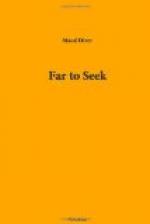And here was he, Roy, still at his old trick of scribbling poems and dreaming dreams. For a fleeting moment, Desmond was out of the picture; but when time was ripe he would be in it again. The link between them was indestructible—elemental. Poet and Warrior; the eternal complements. In the Rig Veda[2] both are one; both Agni Kula—’born of fire’; no fulness of life for the one without the other.
The years dominated by Desmond had been supreme. They had left school together, when Roy was seventeen; and, at the time, their parting had seemed like the end of everything. Yet, very soon after, he had found himself in the thick of fresh delights—a wander-year in Italy, Greece, the Mediterranean, with the parents and Christine——
And now, here he was, nearing the end of the Oxford interlude—dominated by Dyan and India; and, not least, by Oxford herself, who counts her lovers by the million; holds them for the space of three or four years and sets her impress for life on their minds and hearts. For all his dreamings and scribblings, he had played hard and worked hard. In the course of reading for Greats, he had imbibed large draughts of the classics; had browsed widely on later literature, East and West; won the Newcastle, and filled a vellum-bound volume—his mother’s gift—with verse and sketches in prose, some of which had appeared in the more exclusive weeklies. He had also picked up Hindustani from Dyan, and looked forward to tackling Sanskrit. In the Schools, he had taken a First in Mods; and, with reasonable luck, hoped for a First in the Finals. Once again, parting would be a wrench, but India glowed like a planet on the horizon; and he fully intended to make that interlude the pick of them all....
What novels he would write! Not modern impressionist stuff; not mean streets and the photographic touch. No—his adventuring soul, with its tinge of Eastern mysticism, craved colour and warmth and light;—not the mere trappings of romance, but the essence of it that imparts a deeper sense of the significance and mystery of life; that probes to the mainsprings of personality, the veiled yet vital world of spiritual adventure ... Pain and conflict; powers of evil, of doubt and indecision:—no evading these. But in any imaginative work he essayed, beauty must be the prevailing element—if only as a star in darkness. And nowadays Beauty had become almost suspect. Cleverness, cynicism, sex and sensation—all had their votaries and their vogue. Mere Beauty, like Cinderella, was left sitting among the ashes of the past; and Roy—prince or no—was her devout lover.
To the son of Nevil and Lilamani, her clear call could never seem either a puritanical snare of the flesh or a delusion of the senses; but rather, a grace of the spirit, the joy of things seen detached from self-interest: the visible proof that love, not power, is the last word of Creation. Happily for him, its outward form and inward essence had been his daily bread ever since he had first consciously looked upon his mother’s face, consciously delighted in his father’s pictures. They lived it, those two: and the life lived transcends argument.




